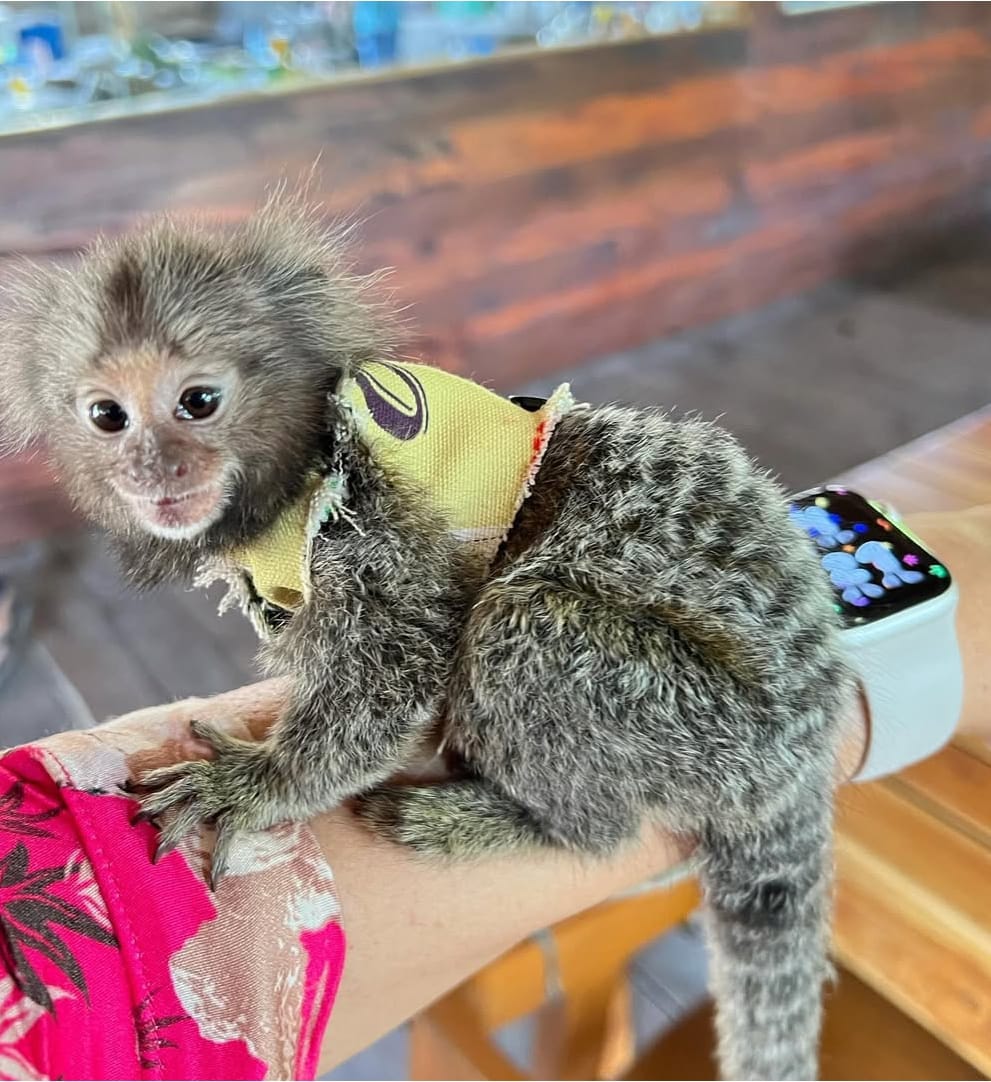Description
Adopt or Buy a Marmoset Monkey – The Complete Care Guide
Introduction to These Fascinating Primates
Marmosets are among the most captivating exotic pets, known for their tiny size, expressive faces, and lively personalities. Native to the rainforests of South America, these intelligent creatures have become popular for those seeking a unique companion. If you’re considering bringing one into your home, this guide covers everything from their behavior to care requirements and legal considerations.
What Makes Them Special as Pets?
These Marmoset offer a distinctive pet ownership experience due to their social nature and engaging antics. Here’s what sets them apart:
-
Compact Stature: Measuring just 5 to 8 inches, they’re easier to house compared to larger primates.
-
Playful Demeanor: Highly active and curious, they thrive on interaction and mental challenges.
-
Longevity: With proper care, they can live between 15 to 20 years.
-
Strong Bonds: They develop deep connections with their caregivers, offering companionship unlike traditional pets.
Finding a Reputable Source for Your New Companion
Acquiring a Marmoset ethically is crucial. Unscrupulous sellers often exploit wildlife, so always prioritize reputable sources.
Where to Responsibly Acquire One:
-
Licensed Breeders – Ensure they follow humane practices and provide health records.
-
Rescue Organizations – Some specialize in rehoming primates needing a second chance.
-
Registered Exotic Pet Stores – Only purchase from establishments with proper permits.
Always verify local regulations, as laws regarding ownership vary widely.
Essential Care Guidelines – Habitat, Nutrition, and Social Needs
1. Creating the Ideal Living Environment
Their enclosure should mimic their natural habitat as closely as possible.
-
Enclosure Dimensions: Minimum of 4x4x6 feet, with vertical space for climbing.
-
Climate Control: Maintain temperatures between 75-85°F with moderate humidity.
-
Enrichment: Incorporate branches, ropes, and puzzle toys to encourage natural behaviors.
2. Dietary Requirements for Optimal Health
A balanced diet is critical for their well-being.
-
Staple Food: High-quality primate pellets formulated for their nutritional needs.
-
Fresh Supplements: Fruits (like bananas and berries), vegetables, and protein sources such as insects or boiled eggs.
-
Hydration: Clean water must be accessible at all times.
3. Meeting Their Emotional and Social Needs
These creatures are highly social and require consistent interaction.
-
Companionship: Consider housing them in pairs to prevent loneliness.
-
Daily Engagement: Dedicate at least 2-3 hours daily to play and bonding activities.
-
Handling Tips: Move slowly and let them initiate contact to build trust.
Understanding Legal and Ethical Responsibilities
Before making a commitment, it’s essential to research the legal landscape.
-
Permit Requirements: Many regions mandate special licenses for primate ownership.
-
Veterinary Care: Locate a vet experienced in treating exotic species before bringing one home.
-
Ethical Sourcing: Avoid supporting illegal wildlife trade by verifying the breeder’s credentials.
Recognizing and Preventing Common Health Concerns
Proactive care can help avoid many health issues. Be vigilant for:
-
Nutritional Deficiencies: Poor diet can lead to metabolic disorders.
-
Dental Problems: Regular check-ups are necessary to maintain oral health.
-
Infections: Routine health screenings can catch issues early.
A well-maintained environment and diet significantly enhance their quality of life.
Frequently Asked Questions
Q: What’s the average cost of acquiring one?
A: Initial costs range for a Marmoset is from 1,500to4,000, with ongoing expenses for food, housing, and healthcare.
Q: Do they exhibit aggressive tendencies?
A: Marmosets are generally friendly, improper socialization can lead to territorial behaviors.
Q: Are they suitable for apartment living?
A: Yes, provided they have adequate space and environmental stimulation.
Q: Would you recommend them for first-time exotic pet owners?
A: Due to their complex needs, they’re better suited for those with prior experience in exotic pet care.
Is This the Right Pet for You?
Owning a Marmoset is a significant, long-term responsibility. They require dedicated care, financial commitment, and a deep understanding of their needs. However, for those prepared to meet these demands, the rewards are immense.
Next Steps for Prospective Owners
If you’re ready to proceed, begin by researching reputable breeders or rescues in your area. Ensure you’re fully compliant with local laws and prepared to provide a lifetime of care.







Reviews
There are no reviews yet.